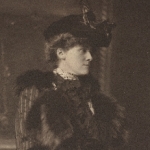 As The Age of Desire inches closer to publication, people have begun to ask me, “Why write about Edith Wharton? What does a woman who wrote 100 years ago have to do with our lives now?”
As The Age of Desire inches closer to publication, people have begun to ask me, “Why write about Edith Wharton? What does a woman who wrote 100 years ago have to do with our lives now?”
From the day I read the House of Mirth, I felt an emotional link to Edith. Her characters are not just influenced by society but trapped by it. They are bred to act a certain way, accomplish a preordained, limited future. But that future stands at odds with who they really are and what they are capable of accomplishing. As a woman growing up in the fifties and sixties, I strongly related to that dilemma. Internally, I felt I was capable of anything, but the girls around me were preparing for “women’s jobs” such as secretaries, teachers, librarians. I wanted more and I expected more of myself. Don’t most of us feel somehow trapped by the expectations that shape us?
Edith, herself, overcame the narrow expectations on which a girl of her era was raised. She wrote brilliantly, with focus, publishing over forty books. She became famous. She is still loved and remembered. But the one part of her life which wasn’t fulfilled was her love life. She was miserably married, had what in those days they called a mariage blanc, a sexless marriage. She felt she was somehow “broken,” incapable of physical pleasure. And then at the age of forty-five, she met Morton Fullerton. For someone so sensitive, so realized, to have a sexual awakening at that age is a thrilling story that needed telling.
Edith’s writing is still relevant. It can sweep us away a hundred years after the fact. I hope The Age of Desire will sweep you away, and perhaps though it is set in Paris at the turn of the last century, you will find a little bit of yourselves in her story.